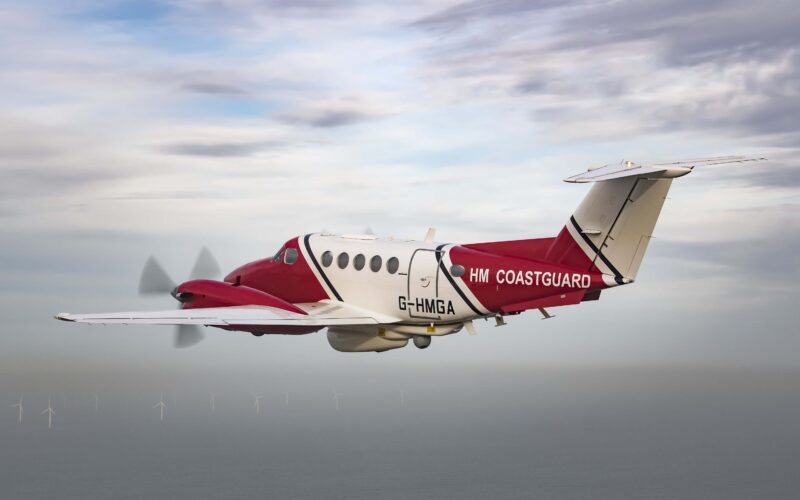Ben Griffiths
Head of Communications at 2Excel Aviation
As I sit staring out of the window of my home office at the rain-soaked garden beyond, it is hard to believe that soon a year will have passed since the first lockdown in the UK. I’ve worked from home for almost the entire time since, bar a few essential visits to our airport sites, such as for hosting broadcast journalists on assignment.
Our company, 2Excel Aviation, has fared better than most during the pandemic. Thanks largely to our diversification across a range of contract air services – including some Government work such as Search and Rescue for the Coastguard – and aerospace engineering, our aircraft have continued to fly throughout. Sister business 2Excel Engineering, has been harder hit as the global airline sector remains largely grounded.
I joined 2Excel in mid-2019 after a 20-year career in daily news journalism and a few years as a specialist aerospace and defence communications adviser within a London PR agency. I supported companies such as Airbus and Malaysia Airlines, along with the aircraft lessor SMBC Aviation Capital and a host of others. It’s fair to say none of us were prepared for events of such magnitude.
Covid-19 also meant an unexpected pivot in the focus of my work. I was excited to arrive in post just after the Royal International Air Tattoo, held annually at RAF Fairford and displaying the world’s military airpower along with associated civilian partners. RIAT is always a dynamic event and there was much to look forward to as the industry continued to grow heading towards 2020.

Ben Griffiths
My role, as I saw it, would be to bring 2Excel ‘out of the shadows’ by crafting an external communications plan to build the business’ corporate profile, including media engagement.
In the event, the bulk of what I have been up to during the pandemic has been focused inwards. Engaging properly with our employees was my priority, to ensure they were kept fully abreast of developments and what the constantly changing UK Government guidelines meant for both them as individuals and us as a business. That meant working very closely with our HR department. We also set up a Pandemic Management Team to ensure all aspects of the fallout were considered quickly and appropriate action taken across the group to safeguard employees, customers and other stakeholders.
It was imperative to reassure all employees that our Management Board and founders have a firm hand on the tiller and are doing everything in our power to continuing delivering outstanding service to our customers. That’s what will keep all of us in paid work now and in the future.
The second aspect of my role has been public affairs – working behind the scenes with various Government departments, civil servants, politicians, lobbyists and regulators to ensure we are operating within the Covid-19 guidelines and that these properly reflected the needs of companies like ours to be able to function during the pandemic. This has involved telling our story to ministers and their staff about the impact of the pandemic (and Brexit!) on our industry.
Meanwhile, many of our people were classed as essential key workers due to the nature of their roles supporting life-saving Search and Rescue, or flying repatriation flights for the Foreign Office or bringing much-needed vaccines into the UK from Europe. Ensuring the relevant Government stakeholders understood how we worked and what we required to enable those flights to continue without disruption was crucial. I believe we’ve been successful in that effort.

Throughout, my mission was to clearly communicate internally where we were as a business compared to the wider sector, that we were stable, our revenues were continuing to flow and would continue supporting our headcount. We reconfigured, including putting some people on furlough and making a small number of redundancies, so we could not only face up to the new reality today but also to position us to benefit from the eventual upturn.
I have also encouraged my team to focus on the people stories, the individuals within any business that make it tick. What do they do every day? How are they faring amid these unprecedented events? What lessons can be learned? It’s been a salutary reminder that every person is different, with their own hopes and fears, ambitions for life and levels of engagement with the business and the wider industry.
Giving people the platforms to tell their stories, whether in newsletters, via social media or videos, has paid dividends and – I hope – helped to create a greater team spirit during a very difficult time for many. Some were furloughed, others struggled with ill or shielding relatives or other problems at home such as childcare once the schools closed. Trying to build understanding that every management decision is designed to give us the best possible chance of survival at the height of the crisis has been vital. Positive feedback indicates that this additional effort was worthwhile.
I know I’m not alone in our industry in finding it hard to always see the bright spots amid the constant drip feed of gloom. But I’m confident that aviation will soon bounce back once appropriate numbers of the world’s population are vaccinated. I for one am desperate to get airborne again in my co-owned de Havilland Chipmunk. It’s unthinkable that aviation as we knew it won’t return.
Since the advent of mass air travel, flying has changed the world. It’s been an incredible creator of memories, of business opportunities and economic growth and, most importantly, of relationships. As a natural optimist I see the current difficulties as severe turbulence at the tail end of aviation’s first century. The next 100 years are full of promise, not least the technology to enable the industry to decarbonise and once again push forward like the early pioneers. Resilience is key.

